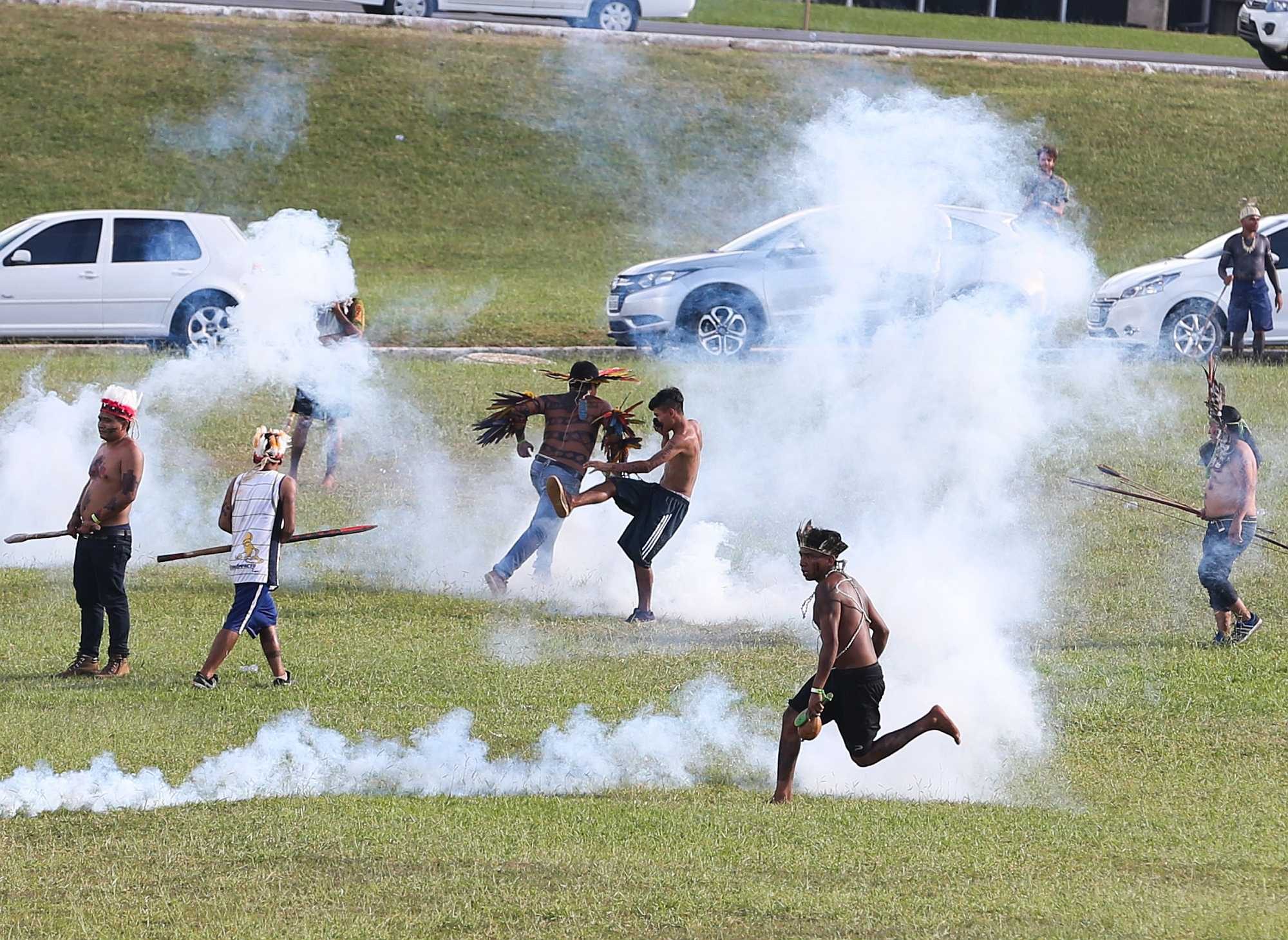Brazilian Indians defied police repression in Brazil’s capital city on Tuesday, as officers fired rubber bullets and tear gas while tribe members shot arrows in return during a protest against large farmers’ encroachment on reservations.
The demonstration was peaceful until police blocked indigenous contingents, preventing protesters from climbing a ramp that led into the congressional building, according to a Reuters photographer on the scene.
The clashes ended around dusk. Some Indians suffered light injuries. There was no immediate word whether any officers were hurt.
Dozens of Indigenous people are killed each year in Brazil in fights with farmers and ranchers over land, often in the relatively lawless Amazon region, where hired gunmen have been used to push the indigenous off resource-rich reserves.
Sonia Guajajara, a coordinator for the march, said some 4,000 Indigenous people and supporters took part in the protest.
It focused on legislation that would give the last word on deciding land boundaries for Indigenous reservations to Congress, where a powerful farm lobby holds sway. Currently, Brazil’s president retains the power to set such boundaries.
“We carried 200 coffins symbolizing the genocide and deaths of Indigenous peoples at the hands of the authorities allied to agribusiness,” Guajajara said.
She said the violent police response was nothing compared to that suffered by indigenous people in territories where deadly clashes continue over disputed land.
Arrows
Several demonstrators attempted to occupy the pond in front of the congressional office and were met by police who used rubber bullets, pepper spray and flash bombs to disperse the crowd. In response, Indigenous protestors shot arrows at the police and in the direction of Congress.
On several occasions, indigenous women attempted to form a human shield around the main lawn in front of Congress. However, the group was dispersed by police. According to local reports, one indigenous woman was injured and four were detained. Makeshift coffins were also thrown in the pond, symbolizing state-sanctioned deaths of Indigenous people.
While military police estimated 2,000 people at the encampment on Tuesday, indigenous organizers claimed a total of 3,000 participants.
On Monday, several Indigenous Brazilian groups set up Acampamento Terra Livre, Free Land Camp, in front of Brazil’s Congress. The encampment is intended to serve as headquarters for five days of protests demanding respect for the earth, the demarcation of indigenous lands, an end to the weakening of public institutions and policies aimed to protect the rights of Indigenous peoples and several other demands.
Thousands of Indigenous people from across the country are expected to participate in the demonstration in coming days.
According to Free Land Camp organizers, the mass mobilization is intended to unify struggles in defense of Indigenous Brazilians and while discussing and adopting political demands combating the constitutional violations of Indigenous peoples’ rights. The mobilization is also dedicated to combating the emergence of anti-Indigenous public policies implemented by the Brazilian government.
After Protests
Indigenous people who went to Brasília to protest against threats to their rights met with Senate President Eunício Oliveira to discuss their demands. The issue will also be the subject of a public hearing at the Senate’s Human Rights Committee.
The protesters were at the Acampamento Terra Livre, an event that brings representatives of ethnic groups from all Brazilian states to Brasília annually.
Sônia Guajajara, executive coordinator of an indigenous rights advocacy group called Coordination of Indigenous Peoples in Brazil (APIB), says the group is demanding the government to drop a constitution amendment bill (PEC 2015) tabled in 2000, which sought to hand over land demarcation authorities from the Executive branch to the Legislature.
“Our chief motivation is protecting our land rights. The National Foundation for Indigenous Peoples (FUNAI), an agency housed under the Ministry of Justice, has also been undermined,” she said.
According to her, the protest is also concerned with a bill on mining on indigenous lands. “The National Congress wants to establish pro-mining laws at all costs and give indigenous territories away to mining companies,” she said.
There are plans for a new indigenous march in Brasília on Thursday (April 27) for the meetings where the final document of the Acampamento Terra Livre will be presented.
teleSur/ABr

